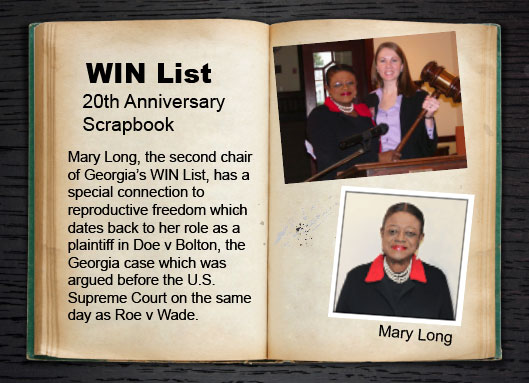In celebration of, and preparation for, our 20th Anniversary event, we’ve selected some of the most meaningful moments from our archives to share. The remarks below were written by our founding Chair and Executive Director Melita Easters, adapted from those given at Mary’s 65th birthday celebration in 2006.
Mary Long, the second chair of Georgia’s WIN List, has a special connection to reproductive freedom which dates back to her role as a plaintiff in Doe v Bolton, the Georgia case which was argued before the U.S. Supreme Court on the same day as Roe v Wade.
Only women “of a certain age” remember what it was like before the court struck down highly restrictive abortion laws with a historic ruling in 1973. But, Mary remembers. She was a nurse at Grady Hospital in the 1960’s and 70’s and saw first hand the emotional and physical trauma suffered by women who experienced botched back alley abortions.
“I’ve seen the results of women who had bad abortion proceedures,” Mary recalled of her experiences as an emergency room nurse in an interview for Georgia State University’s women’s history project. “They would come in lifeless … almost near death.” These women did not have the access to safe and legal abortion young women take for granted today. The only option for many was a back alley provider or an attempt at self-induced abortions which often resulted in hysterectomies or major infections.
Having witnessed the medical consequences, Mary agreed to become an additional plaintiff in the challenge to Georgia’s then highly restrictive laws. At that point, legal appeals took so long the cases needed plaintiffs in addition to the woman who had been denied the abortion procedure. Once a pregnancy came to full term, the appeals were moot if only that woman were a plaintiff.
The Georgia case was championed by legendary attorney Margie Pitts Hames (now deceased.) It was argued on the same day as Roe v Wade and the decision on the two cases was handed down on January 22, 1973.
Mary had another motivation to work with a group which hoped to elect more women to the Georgia General Assembly. She was one of the earliest women to lobby the legislature – with her friend and now Representative Pat Gardner. In those days, few women served under the Gold Dome. Even while working the night shift at Grady, Mary joined Pat to lobby at the Capitol on behalf of the Georgia Nurse’s Association during the day. The pair were at the Capitol from dawn to dusk as Mary once recalled “in shoes that simply made me want to cry.”
A founding member of ERA Georgia, Mary was also a tireless advocate for the Equal Rights Amendment. She once described ERA opponents as “cookie baking, big haired women wearing checked aprons and dragging their babies to the Capitol.” These ERA opponents were constantly to quote Mary, “Praising the Lord, like the rest of us never had a relationship with God Almighty.”
Post ERA, there were huge debates over access to health care, with Mary arguing for nurses and Pat for psychologists against the powerful white men lined up for the Georgia Medical Association. Pat says few Georgians will ever know the difference Mary made in those difficult debates.
Over the years, Mary developed her own signature style always impeccably attired in a St. John Suit, pearls, Chanel purse, and comfortable Feragamo pumps worn with hose even when the temperature topped 100 degrees.
During her professional career at Grady from 1963 to 1985 and with the Arthritis Foundation from 1985 to 2002, Mary blazed many trails in the civic and non-profit world. She was the first African American to serve as President of the Georgia Nurses Association, as chair of the YWCA and as vice chair of the Governor’s Council on Children and Youth. She was a member of Leadership Atlanta’s first fully integrated class.
Mary also served 16 years on the Judicial Nominating Commission and was a highly effective advocate for a more diverse Georgia judiciary at all levels. She was a behind the scenes force in helping some of those women judges, targeted by right wing forces several election cycles ago, retain their seats. She chaired the Georgia Democratic party’s grassroots committee and served as chair of Georgia’s WIN List from 2005 to 2006.
While Mary has no “birth” children, there is a long list of women and men for whom she has served as mentor over the years – many of them former WIN List board members and endorsed candidates.
— By Melita Easters adapted from remarks prepared for Mary’s 65th birthday celebration in 2006.

